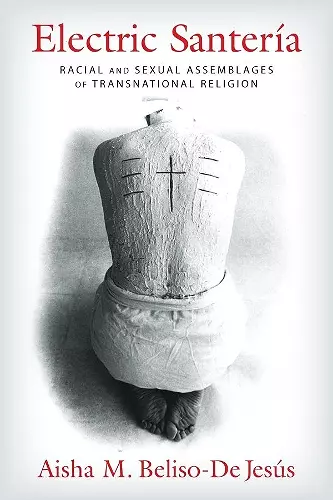Electric Santería
Racial and Sexual Assemblages of Transnational Religion
Format:Hardback
Publisher:Columbia University Press
Published:6th Oct '15
Currently unavailable, and unfortunately no date known when it will be back

Santeria is an African-inspired, Cuban diaspora religion that is rapidly winning adherents across the world. Aisha M. Beliso-De Jesus introduces the term "copresence" to capture the transnational experience of Santeria, in which racialized and gendered spirits, deities, priests, and religious travelers remake local, national, and political boundaries and reconfigure notions of technology and transnationalism. Conducting research in Havana and Matanzas, Cuba, and in New York City, Miami, Los Angeles, and the San Francisco Bay area, Beliso-De Jesus maps the emergence of copresence in transnational places and historical moments, exploring assemblages of race, imperialism, gender, sexuality, and diaspora. Emphasizing Santeria's dynamic circulations, this book advances a nontranscendental understanding of religious transnationalisms.
Drawing on eight years of ethnographic research, Beliso-De Jesús traces the phenomenon of copresence in the lives of Santería practitionersSanteria is an African-inspired, Cuban diaspora religion long stigmatized as witchcraft and often dismissed as superstition, yet its spirit- and possession-based practices are rapidly winning adherents across the world. Aisha M. Beliso-De Jesus introduces the term "copresence" to capture the current transnational experience of Santeria, in which racialized and gendered spirits, deities, priests, and religious travelers remake local, national, and political boundaries and reconfigure notions of technology and transnationalism. Drawing on eight years of ethnographic research in Havana and Matanzas, Cuba, and in New York City, Miami, Los Angeles, and the San Francisco Bay area, Beliso-De Jesus traces the phenomenon of copresence in the lives of Santeria practitioners, mapping its emergence in transnational places and historical moments and its ritual negotiation of race, imperialism, gender, sexuality, and religious travel. Santeria's spirits, deities, and practitioners allow digital technologies to be used in new ways, inciting unique encounters through video and other media. Doing away with traditional perceptions of Santeria as a static, localized practice or as part of a mythologized "past," this book emphasizes the religion's dynamic circulations and calls for nontranscendental understandings of religious transnationalisms.
Aisha Beliso-De Jesus allows us to see the densely intertwined modes of becoming that include the racing, sexing, and engendering of bodies. Electric Santeria is an exciting and timely addition to the series Gender, Theory, and Religion. -- Solimar Otero, author of Afro-Cuban Diasporas in the Atlantic World, and coeditor of Yemoja: Gender, Sexuality, and Creativity in the Latina/o and African Diasporas An inspiring-even astonishing-piece of anthropological research. -- John L. Jackson Jr., author of Thin Description: Ethnography and the African Hebrew Israelites of Jerusalem A brilliantly coherent and insightful contribution to the way that we think about the complexities and nuances of new transnational formations. This artfully mastered ethnography is bound to become an influential staple for a range of actors: Santeria practitioners, academics, and cultural critics. Not only does it demand from its readership a rethinking of our ontologies of knowing, but it also requires that we take seriously affective practices in clarifying the way we make sense of our world. This is a must read for all! -- Kamari Clarke, University of Pennsylvania Ethnographically rich and theoretically audacious, Beliso-De Jesus's Electric Santeria breathes fresh air into the scholarship on Afro-Cuban ritual praxis. Her principled refusal of an analytic of transcendence, her spirited critique of conventional approaches towards mediation, her focus of the sensorium, and her mobilization of black feminist and queer theory give us a handle on problems that anthropologists of religion and religious studies scholars have yet to pay full attention to. -- Stephan Palmie, author of The Cooking of History: How Not to Study Afro-Cuban Religion In this brilliant, theoretically exciting, and innovative ethnography, Beliso-De Jesus explains Santeria in Cuba in terms of a transnational, diasporic geo-ontology. Critiquing the ubiquity of religious universals-based Christian notions of transcendence and transubstantiation, she reveals Santeria's 'trans' as an assemblage of co-presences, in which nationalisms, gender, and sexuality are mediated through sound, image, and sense. Electric Santeria is a new 'classic' for religious studies and for African diaspora studies. -- Inderpal Grewal, Yale University An innovative exploration of a protean and complex religious phenomenon, Electric Santeria presents a powerful challenge to the longstanding dominance of the Abrahamic within anthropological scholarship on religion. Drawing on her own vast ethnographic archive, Beliso-De Jesus carries us along the historical and transnational peregrinations of people, spiritual forces, racial formations, and nationalist projects that together constitute the relational ontology of Santero worlds. This is a work of considerable insight and theoretical daring, a rare accomplishment that deserves to be widely read. -- Charles Hirschkind, University of California, Berkeley Electric Santer'ia should be required reading for ethnographers of not only Cuba and African-inspired religious traditions, but any new religious movements that challenge Western theories of being in the world. Nova Religio This book is a major breakthrough in the conceptualization of transnational religious ontologies be they in Cuba or not. American Anthropologist This book is an important contribution to writing stories that are not nationally bounded but also that work to look beyond binary dualisms. Sociology
- Winner of Albert J. Raboteau Book Prize for the Best Book in Africana Religions, Journal of Africana Religions 2016
ISBN: 9780231173162
Dimensions: unknown
Weight: unknown
304 pages